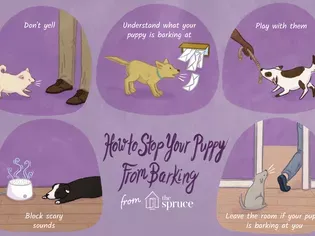10 Ways to Help Stop a Puppy Dog From Barking
Updated on 04/26/24

10 Proven Techniques to Quell the Barking Cacophony of Puppyhood
As a new puppy parent, the incessant barking of your adorable fur baby can be a symphony of frustration. While barking is a natural behavior for dogs, excessive barking can disrupt your household harmony and disturb neighbors. Don't despair, dear readers! We've compiled 10 expert-approved techniques to help silence the barking brigade and restore tranquility to your abode.
1. Identify the Triggers:
* Boredom: A bored puppy seeks entertainment by barking. Provide ample interactive toys, chewing objects, and play sessions to keep them mentally stimulated.
* Anxiety: Fear, separation anxiety, or loneliness can trigger excessive barking. Address these underlying emotions with positive reinforcement, crate training, and companionship.
* Attention Seeking: Puppies bark to get your attention. Ignore unwanted barking but reward them with treats, praise, or play when they are quiet. This teaches them the desired behavior.
2. Exercise and Mental Stimulation:
* Physical Activity: A tired puppy is a quieter puppy. Engage them in regular walks, fetch, or playtime to release pent-up energy and promote mental calmness.
* Mental Challenges: Puzzle toys, treat dispensers, and obedience training provide mental stimulation that reduces boredom and barking.
3. Obedience Training:
* "Quiet" Command: Teach your puppy the "quiet" command by saying it calmly when they bark. Reward them with treats or praise when they stop barking.
* Positive Reinforcement: Use treats and verbal praise to reward your puppy for desired behaviors, such as being quiet when you command them to.
* Consistency and Patience: Training takes time and consistency. Don't get discouraged if your puppy doesn't respond immediately. Keep practicing regularly.
4. Crate Training:
* Safe Space: A crate provides a designated safe space for your puppy to rest and retreat. Introduce them to the crate gradually and make it a positive experience by placing treats and toys inside.
* Calm Response: When crating your puppy, remain calm and avoid making a fuss. This helps them associate the crate with a sense of security and calmness.
5. Bark Collars (Use with Caution):
* Citronella Bark Collars: These collars emit a burst of citronella spray when the puppy barks, creating an unpleasant sensation that discourages them from barking.
* Ultrasonic Bark Collars: These devices emit a high-pitched sound that is inaudible to humans but deterrent to dogs, discouraging barking.
6. Bark Deterrents:
* Motion-Activated Devices: These devices detect barking and emit a loud noise or flash of light to startle the puppy and interrupt the barking.
* Bubble Machines: The sudden release of bubbles can surprise and distract puppies, disrupting their barking.
7. Desensitization and Counter-Conditioning:
* Identify Specific Triggers: Determine what specific triggers cause your puppy to bark excessively.
* Gradually Introduce Stimulus: Expose your puppy to the trigger in a controlled environment and gradually increase the intensity while rewarding them for remaining calm.
* Positive Association: Pair the trigger with positive experiences, such as treats or praise, to change their emotional response to it.
8. Exercise in Quiet Areas:
* Neutral Territory: Take your puppy on walks or play sessions in quiet areas where there are fewer triggers for barking.
* Calming Environment: Create a calming atmosphere by using calming music or pheromone diffusers in the designated quiet area.
9. Veterinary Consultation:
* Underlying Medical Issues: Sometimes, excessive barking can be a symptom of an underlying medical condition, such as pain or discomfort. Consult a veterinarian to rule out any health issues that may contribute to the barking.
* Behavioral Assessment: A veterinarian or certified animal behaviorist can provide a comprehensive behavioral assessment to identify the root cause of excessive barking and develop a personalized treatment plan.
10. Patience and Consistency:
* Immediate Response: Address barking behavior promptly to reinforce the desired outcome.
* Long-Term Commitment: Stopping excessive barking is a gradual process that requires patience and consistency. Don't get discouraged by setbacks, and stay committed to training and positive reinforcement.
Explore More Pets

Basic Training
Puppy and Baby Introductions

Working Dog Breeds
All About Search and Rescue Dogs

Dog Treatments
Puppy Vaginitis: Signs, Causes and Treatment

Dog Adoption
After More Than 1,200 Days in the Shelter, Coco Goes Home

Basic Training
How to Train Your Puppy to Go on Potty Pads

Hybrid Dog Breeds
The Difference Between a Mutt, Mixed Breed, or Designer Dog?

Dog Treatments
Nail Problems in Dogs

Puppies
7 Reasons Why Two Dogs Are Better Than One